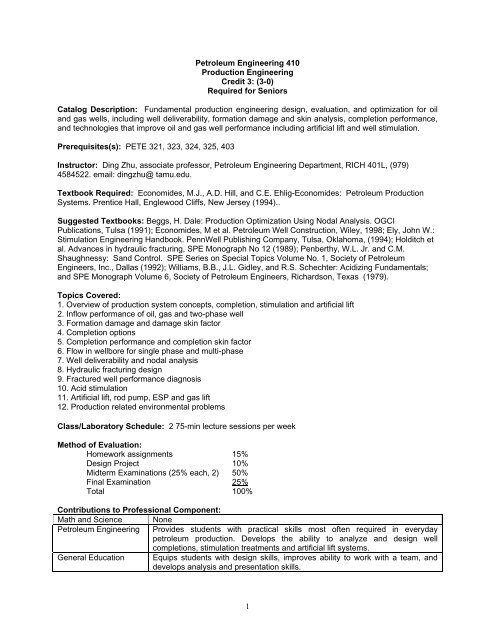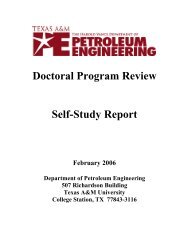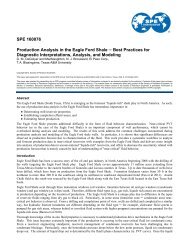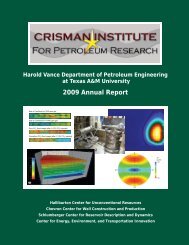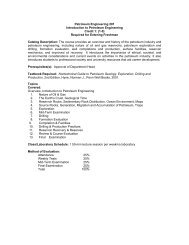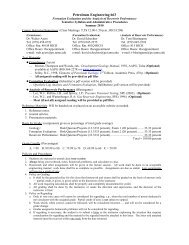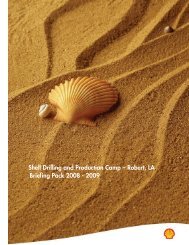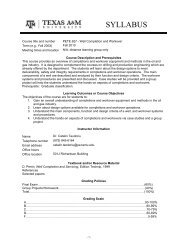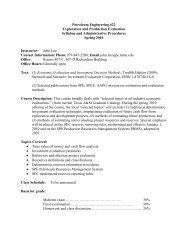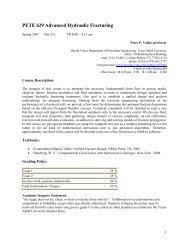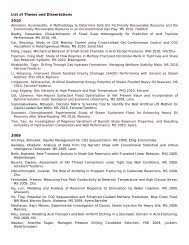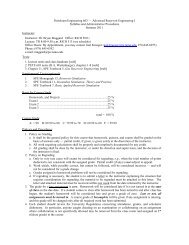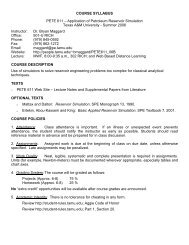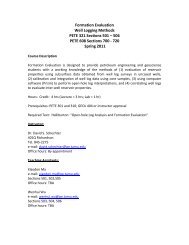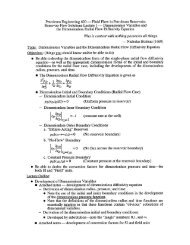Nontechnical Guide to Petroleum Geology, Exploration
Nontechnical Guide to Petroleum Geology, Exploration
Nontechnical Guide to Petroleum Geology, Exploration
Create successful ePaper yourself
Turn your PDF publications into a flip-book with our unique Google optimized e-Paper software.
<strong>Petroleum</strong> Engineering 410<br />
Production Engineering<br />
Credit 3: (3-0)<br />
Required for Seniors<br />
Catalog Description: Fundamental production engineering design, evaluation, and optimization for oil<br />
and gas wells, including well deliverability, formation damage and skin analysis, completion performance,<br />
and technologies that improve oil and gas well performance including artificial lift and well stimulation.<br />
Prerequisites(s): PETE 321, 323, 324, 325, 403<br />
Instruc<strong>to</strong>r: Ding Zhu, associate professor, <strong>Petroleum</strong> Engineering Department, RICH 401L, (979)<br />
4584522. email: dingzhu@ tamu.edu.<br />
Textbook Required: Economides, M.J., A.D. Hill, and C.E. Ehlig-Economides: <strong>Petroleum</strong> Production<br />
Systems. Prentice Hall, Englewood Cliffs, New Jersey (1994)..<br />
Suggested Textbooks: Beggs, H. Dale: Production Optimization Using Nodal Analysis. OGCI<br />
Publications, Tulsa (1991); Economides, M et al. <strong>Petroleum</strong> Well Construction, Wiley, 1998; Ely, John W.:<br />
Stimulation Engineering Handbook. PennWell Publishing Company, Tulsa, Oklahoma, (1994); Holditch et<br />
al. Advances in hydraulic fracturing, SPE Monograph No 12 (1989); Penberthy, W.L. Jr. and C.M.<br />
Shaughnessy: Sand Control. SPE Series on Special Topics Volume No. 1, Society of <strong>Petroleum</strong><br />
Engineers, Inc., Dallas (1992); Williams, B.B., J.L. Gidley, and R.S. Schechter: Acidizing Fundamentals;<br />
and SPE Monograph Volume 6, Society of <strong>Petroleum</strong> Engineers, Richardson, Texas (1979).<br />
Topics Covered:<br />
1. Overview of production system concepts, completion, stimulation and artificial lift<br />
2. Inflow performance of oil, gas and two-phase well<br />
3. Formation damage and damage skin fac<strong>to</strong>r<br />
4. Completion options<br />
5. Completion performance and completion skin fac<strong>to</strong>r<br />
6. Flow in wellbore for single phase and multi-phase<br />
7. Well deliverability and nodal analysis<br />
8. Hydraulic fracturing design<br />
9. Fractured well performance diagnosis<br />
10. Acid stimulation<br />
11. Artificial lift, rod pump, ESP and gas lift<br />
12. Production related environmental problems<br />
Class/Labora<strong>to</strong>ry Schedule: 2 75-min lecture sessions per week<br />
Method of Evaluation:<br />
Homework assignments 15%<br />
Design Project 10%<br />
Midterm Examinations (25% each, 2) 50%<br />
Final Examination 25%<br />
Total 100%<br />
Contributions <strong>to</strong> Professional Component:<br />
Math and Science None<br />
<strong>Petroleum</strong> Engineering Provides students with practical skills most often required in everyday<br />
petroleum production. Develops the ability <strong>to</strong> analyze and design well<br />
completions, stimulation treatments and artificial lift systems.<br />
General Education Equips students with design skills, improves ability <strong>to</strong> work with a team, and<br />
develops analysis and presentation skills.<br />
1


